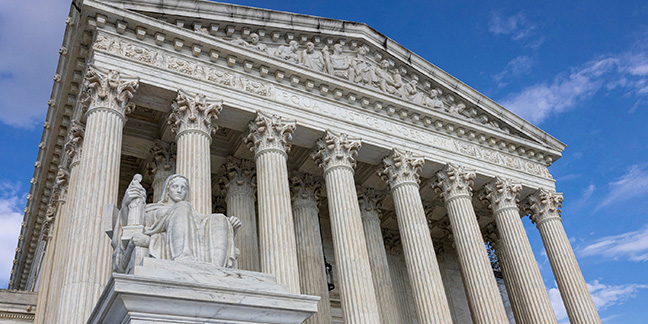 WASHINGTON, D.C. — The U.S. Supreme Court heard oral argument April 2 in a case concerning South Carolina's attempt to prevent Planned Parenthood from participating in its Medicaid health program, in what could determine the nation's largest abortion provider's ability to use public funds in states that have restricted abortion.
WASHINGTON, D.C. — The U.S. Supreme Court heard oral argument April 2 in a case concerning South Carolina's attempt to prevent Planned Parenthood from participating in its Medicaid health program, in what could determine the nation's largest abortion provider's ability to use public funds in states that have restricted abortion.
Supporters of allowing Planned Parenthood to receive Medicaid funds point to that group's involvement in cancer screening and prevention services -- such as pap tests and HPV vaccinations -- but critics argue the funds are fungible and could be used to facilitate abortion.
Efforts to strip Planned Parenthood of these or other taxpayer funds are sometimes called "defunding," such as a 2018 executive order signed by Gov. Henry McMaster, R-S.C., stripping two Planned Parenthood clinics in the state of Medicaid funds, a federal program for health care for people with low incomes that is administered by the states.
Federal law generally prohibits the use of Medicaid funds for abortion, and McMaster argued at the time that abortion clinics should be excluded from participating in the Medicaid program. But the Planned Parenthood affiliate in South Carolina and its Medicaid patient, Julie Edwards, argued that any patients eligible for Medicaid should have free choice to obtain health care from any qualified provider.
A key question in the case is whether Medicaid recipients have the ability to sue over such decisions to maintain their chosen provider.
But John Bursch, Alliance Defending Freedom senior counsel and vice president of appellate advocacy, who represented the state, argued before the high court that "the words 'free' and 'choice' don't appear anywhere" in the statute relevant to Medicaid.
However, pointing to language in the Medicaid law specifying recipients can choose their doctor, Chief Justice John Roberts asked elsewhere during argument, "If the person thinks that's not being provided, what remedies do they have?"
Attorney Nicole Saharsky, who is representing Planned Parenthood South Atlantic before the court, argued that there is "no alternative federal remedy."
"There is no way for individuals to challenge the state's decision to deny them their provider of choice," she said. "There is no federal cause of action. There is no administrative remedy. Congress expected that an individual would be able to sue in the rare instance when a state is keeping a needy patient away from a qualified and willing provider, if the individual can't sue, this provision will be meaningless."
Planned Parenthood South Atlantic has argued its role in South Carolina's health system is "irreplaceable," claiming it provides birth control and cancer screenings to people who cannot afford them elsewhere.
According to its website, each of the two clinics Planned Parenthood South Atlantic operates in South Carolina offer abortion prior to the state's six-week ban.
National health statistics on abortion compiled by the Centers for Disease Control and Prevention, show approximately 39.5% of abortions take place within the first six weeks of pregnancy.
The Catholic Church teaches that all human life is sacred from conception to natural death, and as such, opposes direct abortion.
A decision in the case is expected by the end of the court's current term, typically in June.
— Kate Scanlon, OSV News


